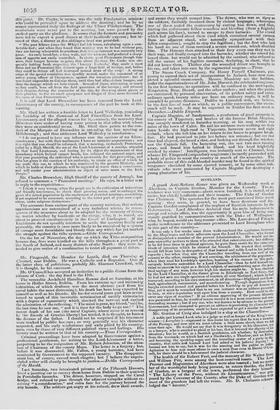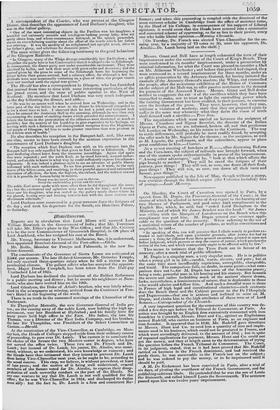SCOTLAND.
A grand Anti-Reform dinner was given on Wednesday week at Aberdeen, to Captain Gordon, Member for the County. The at- tendance was very numerous—about seven hundred, it is stated, of all ranks, but chiefly landlords and their tenants. The Duke of Gordon u-as Chairman. The speeches for the most part contained little weak quoting : they seem, in general, to have been decorous and dry. Captain Gordon complained of the neglect of Scottish interests by the Government. Lord Aberdeen declared that his main inducement to accept and ietuin office, was the opportunity it gave him of being con- stantly gratified by communications with the Duke of Wellington! who, he hoped, would ere long resume office. Mr. Lumsden of Piteapk spoke in reference to the addresses presented to Lord Brougham when in this part of the country_ It was only a few weeks since these walls reechoed the applauses bestowed by the illagi:trates and their adherents upon the Lord Chancellor, who formed so distinguished a member of the resent Administration. He would not im- pute unworthy motives to those who attended that entertainment; but differing as he did from them in political opinions he gave them credit for the seine rec- titude of intention which he claimed for himself. He trusted that nothing would fall from him in derogation of that learned and noble Lord in his judicial capacity ; but when they saw the Chancellor travelling front one end of the country to the other, receiving, if not courting, the adulations of the populace when they read his Lordship's speeches, boasting of his success in this path, certainly hitherto untrodden by a Lord Chancellor—then be held himself eo- titled to exercise his right as a British subject, of animadverting upon the poli- tical sayings of any man, however high his station might be. It was observed by the Lord Chancellor, at the dinner given in Edinburgh to Earl Grey, that he had not seen one single specimen of reaction all over Scotland; which he had traversed, according to his own statement, in all directions—Highland and Low- land, agricultural, commercial, and manufacturing Though deputations film burghs crowded around and paraded before his Lordship to pay all honour to him, yet it must be remarked that in no one instance was an address presented to him, or did a deputation wait upon him from a county. How cold he ob- serve any signs of reaction? If an address approving of the present Ministry was presented to him, he would of course receive it in a most coutteous and con- descending manner ; but if any one, who was known to be adverse to the present Government, had attempted to present an address depreciating its character and disapproving of its measures, could he have expected to get a similar welcome? Mr. Gordon of Craig also indulged in a slap at the Chancellor—
A noble and learned Lord, who is a judge as well as keeper of the King's con- science—(Laughter)—expressed in this room his regret that he was a member of the Peerage, and now said we must reform a little more slowly than we did some time ago. He would not say that it was derogatory to his character, nor as a lawyer, who is entitled to plead at his bar, that it lowered the dignity of ha situation ; but he would, as a Scottish gentleman, ask whether, by descending from the woolsack, on which had sat a Hardwicke, a Thurlow, and an Eldon. amid becoming the speaking organ awl the travelling orator of a party in thi.
country, that noble and learned Lord had added to his judicial dignity? It became not him to say, but it was for the meeting and the public to judge. Agitationto him was more odious in such a man than even in Daniel O'Con- nell, for there should be a halo around the judicial character.
The health of Sir Robert Peel, and the memory of Sir Walter Scott and William Pitt, were among the best-received toasts. The Lord Provost and Magistrates of Aberdeen were also toasted ; but no mem- ber of the worshipful body being present, to return thanks, the Duke of Gordon, as a burgess of the town, performed the duty himself.
" The Liberty of the Press, without its Licentiousness," was 10.°' posed by the Convener of the County, after the Duke of Gordon with most of the grandees had left the room. Mr. D. Chalmers ack.nolis hedged the " honour,"
A correspondent of the Courier, who was present at the Glasgow Dinner, thus describes the appearance of Lord Durham's daughter, who was in the ladies' gallery.
" One of the most interesting objects in the Pavilion was his daughter, a beautiful and extremely amiable and intelligent-looking young lady, who sat nearly above him, and whose counteuauce betrayed, as the speech proceeded, almost an overwhelming anxiety about the effect of the words which her father was uttering. It was the anxiety of an enlightened and upright mind, alive to her father's glory, and solicitous for domestic peace."
The same writer gives the following testimony to the good behaviour of the Glasgow Radicals- " In Glasgow, many of the Whigs diverge considerably into Radicalism ; and altogether the party here is less Conservative than it is alleged to be in Edinburgh. In consequence, the dinner party met under considerable excitement. They were admitted by ballot, and took their seats with great order and decorum ; and the reproof given by the press to some of the Edinburgh hosts for beginning the dinner before their guests arrived, had a salutary effect, for although a few in- dividuals were seen occasionally venturing on a glass of wine, the proper viands were not touched until the signal was given."
The Herald has also a correspondent in Glasgow, who has furnished that journal from time to time with some interesting particulars of the late grand event, and the state of public opinion in the West of Scotland. He mentions that Lord Durham was very much indisposed on the day following the dinner, and adds- " Ile was by no means well when he arrived here on Wednesday, and in the Litter part of the day before he went to the dinner he felt himself compelled to go for a short time to bed. I observed that he had a jaded and fatigued look when he entered the Justiciary Hall in the morning, although.he was then only commencing the round of exciting duties which preceded the entertainment. I believe the forms in the presentation of the addresses were shortened as much as possible ; but the anxiety of his Lordship to give expression to his feelings, on meeting with such a flattering and distinguished reception from the Magistracy and people of Glasgow, led him to make greater exertions than was prudent in his delicate state of health."
Ile also describes his reception in the Banquet-hall, and, like every one else, seems to have been struck by the anxious expression in the countenance of Lord Durham's daughter.
" The reception which Earl Durham met with on his entrance unto the Banquet-hall was only equalled by that given to Earl Grey in Edinburgh. The most deafening cheers burst from the immense assemblage. Again and again they were repeated ; and the noble Earl, as he stood forward, seemed embar- rassed, and unable to know in what way he could sufficiently express his acknow- ledgments. It was indeed a glorious sight to see an advocate of public liberty welcomed with such enthusiasm. To see him pressed, as it were, to the very heat ts of his fellow-men, and receiving, in their grateful approval and unbounded expression of affection, the best, the highest, the richest, and the noblest reward that it is possible for human being to receive.
" Proud was his meed, who, ever in the van, Stood the unshrinking patriot and the man !"
The noble Earl never spoke with more effect than he did throughout the even- ing; but the excitement and agitation were too much for him ; and I several times saw his daughter, who was seated in the gallery nearly above where lie was placed, lotting over and looking towards him with the most anxious and affectionate solicitude."
Lord Durham soon recovered in a great measure from the fatigues of the day' and took Isis departure for the South, via Hamilton Palace, on Saturday.



















 Previous page
Previous page